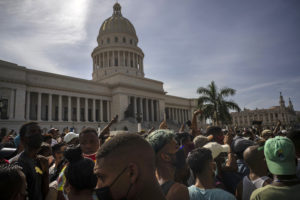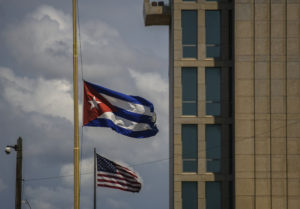By Geoff Thale
In Florida’s Cuban-American community, change is in the air. There have been signs of this change for several years. As we have pointed out in the past, recent polling shows shifting Cuban-American views on U.S. Cuba policy, especially among recent arrivals and young Cuban Americans. Tuesday night, the changing opinions and changing demographics of the Cuban-American community made themselves heard at the polls.
Advocates of change in U.S. policy toward Cuba have long argued that the community is shifting: newer immigrants and younger Cuban-American voters are less committed to continuing the U.S. embargo of Cuba, and U.S. policy toward Cuba is less of a priority issue for them than it was for the previous generation. Defenders of hardline policies toward Cuba have always responded that Cuban-American voting gives the lie to this argument (see the post-election commentary by Capitol Hill Cubans, here). They point to the continuing support for hardline positions in Congress and in the Florida legislature, and they emphasize the modest support for presidential candidates who have more pro-engagement positions. “Where’s the beef?” has been their essential response.
In Tuesday’s election results in Florida, we can see exactly where it is.
As Anya Landau French pointed out yesterday in The Havana Note, and Phil Peters in the Cuban Triangle, Cuban Americans voted for Obama in record numbers. Recent reports suggest that Obama secured 48 percent of the Cuban-American vote, edged out only slightly by Romney. Obama, who liberalized people-to-people travel, dropped the Bush administration’s hostile rhetoric toward Cuba, and allowed Cuban-American families to visit Cuba as much as they want and send as much money to Cuba as they want, increased his percentage of the Cuban-American vote by ten points. The size of the shift is especially significant: until this year, Bill Clinton’s 1996 campaign had held the position as most successful Democratic campaign ever in garnering Cuban-American votes. On Tuesday, Obama surpassed Clinton’s numbers.
Also, on Tuesday night, the hardline bloc’s historical dominance of Cuban-American politics was finally broken: Rep. David Rivera was defeated by moderate Cuban-American Joe Garcia. Rivera introduced several pieces of harsh anti-Cuba legislation, including an amendment to turn back travel regulations to the George W. Bush era. After a bizarre election scandal, in which Rivera allegedly funneled thousands of dollars in cash to support a previously unknown primary challenger, Garcia defeated Rivera by ten points.
And, as William Vidal noted in On Two Shores, Democratic candidate for Florida State Legislature Jose Javier Rodriguez, a Cuban American who supports Obama’s liberalization of travel to Cuba, defeated the hardline incumbent Alex Diaz de Portilla in the district that includes little Havana.
Will these changes affect U.S. policy?
In a second term, the Obama administration will almost certainly defend its family travel, religious, and student travel rules. Obama’s strong showing in the Cuban-American community is convincing evidence that the family travel policy is politically advantageous. It is not clear if they are ready to go much further.
If the administration decided to respond to changing political realities in South Florida, what could it do?
Potential areas for change include:
- Taking Cuba off the list of State Sponsors of Terrorism (particularly since Cuba plays a visible role in encouraging the FARC in Colombia to participate in peace talks with the government and cooperates with the United States on drug interdiction).
- Opening discussions with the Cuban government on a range of issues, including, but not limited to, the release of Alan Gross.
- Relaxing the rules for non-tourist travel to Cuba.
- Increasing cooperation on issues of mutual interest, including preparations for oil spill response, search and rescue, and drug interdiction efforts.
- Relaxing Office of Foreign Asset Control enforcement of business dealings between Cuba and third countries.
There will be pressure from the remaining hardline Cuban-American members of Congress and their allies not to move U.S. Cuba policy into the 21st century. There are still plenty of hardliners who are bent on doing everything they can to turn back the clock on U.S.-Cuba relations. There is still plenty of passionate opposition to the Castro brothers and to Cuba’s Communist government. But the Cuban-American community is changing. The writing is on the wall.
Geoff Thale is WOLA’s Program Director. Mr. Thale has studied Cuba issues since the mid-1990s and traveled to Cuba more than a dozen times, including organizing delegations of academics and members of Congress.
(Photo by Ken Zirkel).


